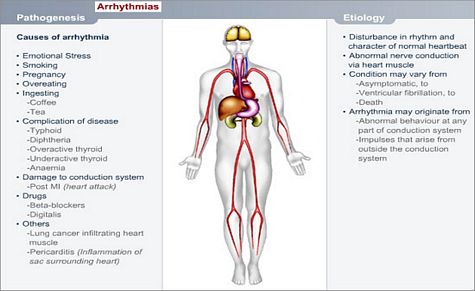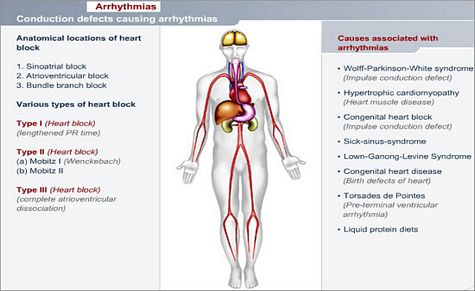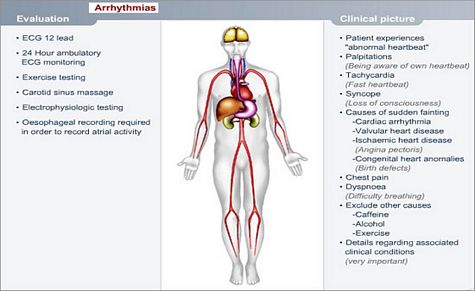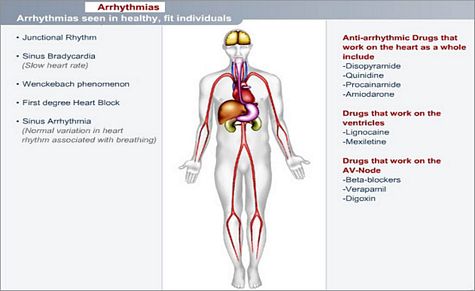What is ARRHYTHMIA?
An Arrhythmia is a disturbance in rhythm and character of the normal heartbeat.
It is associated with abnormalities in nerve conduction of impulses through the heart muscle.
In the normal heart
- The nerve centre (from where repeated signals are sent via nerve conduction bundles to the heart muscle) is located in the right atrium wall (upper heart chamber) and is called the SA-node or sino-atrial node
- The sinus node or SA node (sino-atrial node) receives impulses from the brain (higher centres) and then distribute it via the AV node and bundle branches to the heart muscle
- From the SA node the impulse goes to the AV node (atrioventricular node), which is located between the upper chambers (atriums) and lower chambers (ventricles) of the heart
- From the AV node the impulses are conducted via the left and right bundle branches to the left and right ventricles (lower heart chambers)
Arrhythmias may originate from abnormal behaviour at any part of the conduction system or from impulses that may arise from outside the conduction system, such as heart muscle fibres.

Why does this happen and how may it affect the patient's health?
Arrhythmias may originate from
- Atria (upper heart chambers)
- Ventricles (lower heart chambers)
- Premature ectopic beats that originate from the conduction systems in either the atria or ventricles
Arrhythmia may be brought on by situations such as
- Emotional stress
- Smoking
- Pregnancy
- Overeating
It may be a consequence of underlying illness such as
- Infections e.g. typhoid fever or diphtheria
- Hyperactive thyroid gland
- Under-active thyroid gland
- Low number of red blood cells in blood (anaemia)
It may happen as a result of damage to the conduction system because of diminished oxygen supply to that area (secondary to a heart attack).
It may also be caused by cancerous growths from other organs e.g.
- Cancer of the lungs that infiltrate the heart muscle, or
- Inflammation of the sac surrounding the heart (pericarditis)
Certain medications may also cause arrhythmias, when given at the wrong dosage, such as
- Digitalis
- Beta-blockers
- Cisapride
- Quinidine
- Erythromycin
- Antihistamines

What symptoms may the patient experience?
Patient may experience abnormal heart palpitations in chest.
The heartbeat will feel irregular (sometimes fast; sometimes slow), but the patient will normally become more aware of it when the heartbeat is faster. It may be associated with fainting or the feeling of wanting to faint due to lowering of blood pressure; the patient may experience chest pain during these episodes.
The fainting may be caused by
- Irregular heartbeats
- Lesions of heart valves
- Birth defects of the heart
- Too little oxygen to heart muscle (ischaemia)
- Heart muscle disease (cardiomyopathy)
How is the diagnosis made and what special investigations are required?
An Electrocardiogram (ECG) will clearly show any abnormality of the heart rate and rhythm.
There are a number of specialized ECG tests that can be done, other than a basic twelve lead ECG in order to determine the exact type and cause of an arrhythmia.
A positive family history is important information to obtain; also ask patient regarding what medications he/she may be using.
A thorough risk assessment by a heart specialist.

What is the treatment and prognosis?
There are a large variety of abnormal heart rhythms and each one has its own specific treatment protocol.
The prognosis depends on the
- Type of arrhythmia
- Underlying cause of the arrhythmia and extent to which the condition can be treated e.g. hyperthyroidism
- General health and fitness of the patient

© 2003 Prometheus™ Healthcare (Pty) Ltd
|